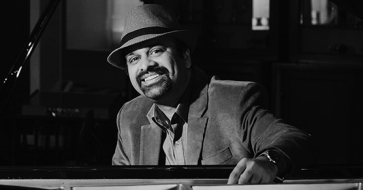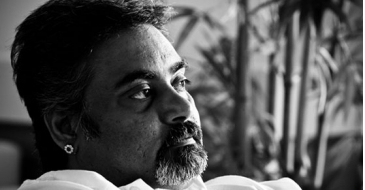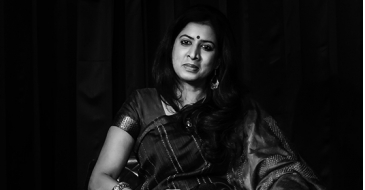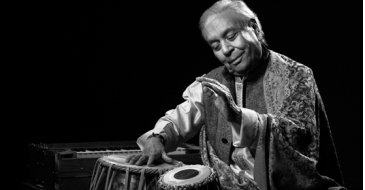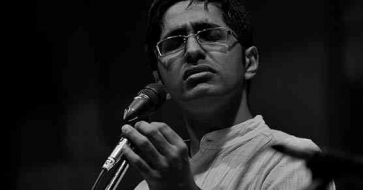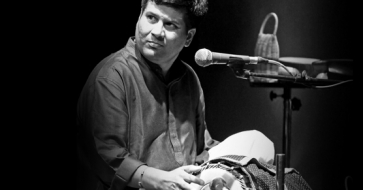What does rhythm mean to you?
In the grand scheme of things, everything seems to be eventually going towards entropy or disorder. Rhythm, to me, is about finding a beautiful way to do that - a beautiful way to fall apart. For example, biologically, the heartbeat is trying to prevent you from going out of control. We create a feeling of order, of regulation, via some beautiful mechanisms with superb designs. That's rhythm to me.
And silence?
Silence is the canvas on which music is painted. A plain canvas is good enough. The respect you have for silence will make every sound you put on the canvas have a purpose. In some ways, this is also an act of entropy. Music is about disturbing silence beautifully, about just being on that edge where you are still holding on with a sense of comfort while respecting the silence the music falls into.
What is your relationship with rhythm?
It is definitely not cerebral. It is much beyond any kind of quantification or measurement. It is very emotional and I relate to it through my senses, my heart and my spirit. I see rhythm in everything around me, be it natural or man-made. The rhythm of a VTEC (Variable Valve Timing & Lift Electronic Control) engine interests me - the precision with which it is made, the amount of torque it dishes out, the range of horsepower it can traverse in just a few seconds, etc. It gives me a feeling of exhilaration. There is rhythm in a game of tennis. I also find rhythm in human interaction. There is this quote - "If you are not living on the edge, you are taking up too much space." There is a certain balance of forces when you are on the edge that allows you to find calmness. That is what I feel about rhythm.
How would you describe your relationship with the mridangam?
I have been with the mridangam from when I was a toddler. By virtue of that, my relationship with the instrument is probably the most intimate connection I share with anything. To me, it is much beyond an instrument and I have seen evidence of the same.
As much as I want to know the mridangam, the mridangam wants to know me too. When I am able to give it enough time, it is probably the best representation of who I can be. It helps me understand who I am in more specific ways. But it is not easy to access this every time I pick up the mridangam. Else, it wouldn't be such a valuable thing. I have to work for it. In some ways, it is a connection I complete with myself.
The mridangam is incredibly amenable and is able to dynamically collaborate with something as soft and subtle as the tabla and something as emphatic as the thavil. It sits right in the middle of that whole spectrum. Of course, when you get to electronic stuff, you have to be good with technology. The instrument is never at fault
As the grandson of the legendary Palghat Sri Raghu, you are part of a legacy. What does that mean to you?
Freedom. My grandfather came from the guru-sishya (teacher-student) legacy of Palghat Sri Mani Iyer but was free enough to incorporate what his guru's contemporaries like Palani Sri Subramania Pillai played. I come from this incredibly open place where I am free to find my path and I am thrilled about it. If you are truly in a legacy, you will find your freedom. Because in all of these years, nobody has ever been trapped by legacy. Else, it is like a bad insurance policy.
Do you feel it is your responsibility to nurture and grow the legacy?
Musically speaking, I don't think there is any expectation or responsibility to uphold what my grandfather played. Originality is key. Imitation, at some level, gives you access to something. But you have to make the shift from imitating to actually being inspired to do something. This is one of the best things a guru can help his sishya do and is exactly what my grandfather did for me. He removed the blinds to show me what I could be good at. It was then up to me to figure out the details and see what I could make of it. You must also note that on the paternal side, I come from an equally important legacy which is the guru-sishya parampara of the saint composer Muthuswami Dikshitar. I have learnt to sing many of his compositions. One of the things that this has taught me is reverence for the melody.
Ultimately, all of this helps you find and develop your own expression. The quality of your legacy is how well you are able to find your path. The legacy imbibes all of this and grows generation after generation.
You grew up in New Jersey, US in an environment probably very different from the one in your grandfather's place in Chennai, India where you learnt the mridangam. How has that shaped your musical and thinking abilities?
When I was home in New Jersey, I was listening only to Carnatic and Hindustani music. When I came to my grandfather's place in Chennai or when he used to visit us in New Jersey, I used to have very intense training sessions in mridangam. As a result of all this, I have a very strong connection to Indian classical music since I was immersed in it from such a young age. When I went to school or to my friends' homes, I would hear the music of the West and was exposed to a different kind of culture. At home, we did things a certain way. At my friends' homes, they did things in a different way. This taught me early on that there isn't only one right way to do things. It enabled me to approach even basic things in music in multiple ways. It helped me think about many things. For example, in a Carnatic music concert, as a mridangam artist, you are seated in almost the same line as the vocalist and you get an opportunity to perform a percussion solo. But as a drummer in a rock band, you may be sitting at the back of the stage hidden behind your instrument, not get a separate solo performance and yet impact the music in an amazing way. So, I used to think - does where you sit, which seems a big thing in the Carnatic scenario, really matter? At least I am not sitting hidden at the back like the rock band drummer; so, it can't be that bad! I realized it's easy to complain about things, but the fact that you are able to complain is in and of itself a privilege. Ultimately, it's about what you do with the music.
You have so many avatars - mridangam artiste, tabla player and Western percussionist. You also teach Indian and Western percussion at the KM Music Conservatory (in Chennai). How do you do all of that?
I must thank my parents and teachers for that. When I went to Dartmouth College which is an Ivy League school, my parents didn't say it is going to cost us an arm and leg and you better become a Wall Street banker to earn a six-figure salary. They said you seem to be good at music, but you are currently playing mridangam in New Jersey like a big fish in a small pond. Expand your horizon in music and see how good you can become. Learn how notation works, how recording works, how technology works in music. Basically, learn how the world of music works! And that's what my teachers there helped me with.
I must also say that amongst the things you listed, I am most capable at playing the mridangam, by virtue of having been with it almost since the time I was born. The rest are facets of mine that I do reasonably well but not at the same level as playing the mridangam.
Does exposure to such a diverse set of things help or does it distract?
It definitely helps me. Why only music? I am into making perfumes and that helps me with my mridangam playing. Let me give you an example. There are three levels of olfactory notes in perfume making, each with a different composition - the top notes that are recognized immediately upon applying the perfume, the middle or heart notes that last longer and the base notes that provide the lasting impression. In sound, the audible frequency spectrum can be thought of as three sections – low, mid and high. I can see parallels to all of this in mridangam. For example, if a certain fragrance with a certain combination of different olfactory notes can be used to provide someone relief, then how can I use a combination of sonic notes from a mridangam to do the same? I love playing around with things and looking at them from different angles. The same goes for any content I create. I like to revisit it to get different perspectives. It doesn't distract so long as I am able to make sense of it all.
Does rhythm in a sense have a universal language? Are there any similarities across these different genres?
There are both similarities and differences. Each genre has its virtues. But I would never say one is better than the other. What is important is that you have to learn each with a certain level of authenticity. There is no point in playing tabla like a mridangam artist. If you have to play tabla, you have to inhabit the authentic world of tabla and learn it there. If you are playing the marimba, you have to know what it means to actually play the instrument. I have been fortunate to have teachers who were able to tell me all of that, free me of any baggage that I came with and help me figure things out.
Do you have to be a different musician when you do each of these? Or are you the same musician inhabiting these different spaces?
Well, I make sure I don't carry any baggage from one space to the other. I make sure I don't impose a doctrine of comfort, which basically is my mridangam because that's my most comfortable thing, on the others.
So what changes, for example, when you play Western percussion?
In Western percussion, I am mostly playing rhythms that are composed. I leverage the repertoire I have exposure to and try to learn anything new that is required. The notation is the reference and the most important thing. My agenda is to bring out a sonic representation of what the composer has notated. This is very different from how I play the mridangam where there is hardly any notation. There are things that you compose for yourself and the execution is not to somebody else's expectations. There is a different discipline in the way you approach it. That for me is the big difference. With western percussion, the notation limits me and, in a sense, I have lesser freedom. But it's also good to put myself through that because after doing that, the detailing of how I play the mridangam may be very different.
Originality is key. Imitation, at some level, gives you access to something. But you have to make the shift from imitating to actually being inspired to do something. This is one of the best things a guru can help his sishya do and is exactly what my grandfather did for me. He removed the blinds to show me what I could be good at. It was then up to me to figure out the details and see what I could make of it
How has all of this shaped you as a mridangam artiste?
It's all been very helpful. All these experiences have only enriched me as a mridangam artiste. I don't think there was ever a situation musically where I came back to revisit the mridangam and I was worse at it. Never.
What happens when you collaborate? What is the process like?
What usually happens, especially when South Indian percussionists collaborate with other cultures, is that the content gets dominated by the repertoire of South Indian percussion. I always try to do the opposite. I see how deeply I can permeate into the comfort zone of the artistes I collaborate with and try to meet them at least, mid-way!

How do you prepare for a collaboration?
Artistes choose to collaborate with you because they have some level of trust in your ability to work together and help co-create. You have to figure out the tools that will help you do this successfully. You should be able to get into their environment and work with them comfortably. You should have a very good understanding of the kind of music they like to create and how you can do something appropriate for that. Therefore, before getting into collaborations, I try to listen to their music to get a good hang of all of this.
It will be interesting to see the reverse happening - my collaborators trying to figure out my comfort zone and meeting me there. But I still have a lot to learn before people start saying let us go into his environment and do something there.
How demanding is it for you to play with such reputed artists?
I have been extremely fortunate to have this incredible blessing of performing with my teachers and artistes who have been much senior to me. I am humbled and try to do the best I can. I have to make sure I am not there to show off my skills or exercise some personal agenda but to work towards the vision they have. I am usually awestruck by them before getting on the stage. But once I start playing, I forget all of that and immerse myself in the music. It is a joy. It is not demanding at all. It's a dream and I am living my dream.
How amenable is mridangam to collaboration with other instruments? What about the tabla?
The mridangam is incredibly amenable and is able to dynamically collaborate with something as soft and subtle as the tabla and something as emphatic as the thavil. It sits right in the middle of that whole spectrum. Of course, when you get to electronic stuff, you have to be good with technology. The instrument is never at fault.
I would like to mention here about the enormous inspiration I personally derive from Ustad Zakir Hussain’s guidance. He has made a huge range of music celebrate the inclusion of tabla. It is primarily his vision that has endured the allure of the tabla as this extremely amenable option in any musical environment.
What is the role of individuality in playing the mridangam?
I have seen different types of performances. In some, the mridangam players have been reluctant to give their best and the concert has failed. In some others, where mridangam players just did their job without trying to do more or less, the concert was good. There have been some performances where mridangam players just took the whole concert to a different plane. The instrument was the same in all the situations. So, I think individuality is to do with the openness, the imagination and the capability of the artiste playing the mridangam.
You are right-handed. But you play mridangam left-handed. How did that happen?
I am told I was left-handed when I was young. But I was trained to become right handed since dominant use of the left hand wasn't considered appropriate in Indian families, at least when I was growing up. I started playing the mridangam even before I began to read or write. I played it left-handed with good comfort and my grandfather told specifically not to change that. I don't know if I had a preference back then. When my grandfather came back from his concerts, I would insist that we both played on the mridangam he had taken for his concert. We would sit across each other and keep the mridangam in the middle. He was right handed. So, maybe it made sense for me to play it left-handed and unbeknownst to me, I became a left-handed player.
Does that have any impact on the way you think or play?
Because I started using the right hand dominantly for almost everything else, I developed a certain kind of strength in it. So, I have to make sure there is a balance in how I use it with my left hand when I play the mridangam.
How easy is it to be a left-handed player when most mridangam artistes around you are right handed?
I will tell you what happened when I was 12. I played at the Music Academy, Chennai with Chitravina Ravikiran, Mysore Manjunath and my grandfather. I remember the exact date. It was 17th December 1995. I was sitting on the left side of the stage exactly opposite to where my grandfather was seated. Being a kid from the US, I think I got a fair share of the audience attention. After the concert got over, an elderly gentleman came to me and asked me to play right handed from the next year since the left hand wasn’t considered appropriate to use. But, as mridangam artistes we have to use both our hands to play! So, to me, these things don't really matter.
You perform with vocalists as well as instrumentalists. How do things change when you perform with someone who is expressing music via the voice versus someone who is expressing it via an instrument? Is there a shift in the way you use your instrument?
At one level, there is no difference because I am there to serve the music, whether I play with voice or with another instrument. But if I were to go a bit deeper, there is a difference.
When I play with a vocalist, I try to incorporate the shabda (speech sound) of whatever is being sung. Sometimes, I just stop playing for a few seconds because the poetic nature of the shabda goes very well with the sound of that respite. In the case of an instrument, the words of a composition aren't being spelled out. But I have to make it comfortable enough for the artist to establish that level of connection, say for example, when he or she is playing Mokshamu Galada on an instrument. When the instrumentalist is doing niraval (improvisation of a melodic line in a composition), I believe they are feeling the lyrics in a certain way. I try to get inside of that and support it as much as possible. Having learnt songs during my childhood has definitely helped. There is a certain depth to most of the songs and to the kind of melody that is used. I can feel the emotions. There is, may be, an additional level of care or attention to detail from my side to match the emotion they are trying to convey since they aren't singing the words explicitly.
There are also other elements to consider which are advantageous to instruments. Some instruments can give you longer continuity of sound than voice because the vocalist has to stop to take a breath. When I am playing with such instruments, should I punctuate or keep going on? I have to think at a much basic level than the music itself, in terms of how the entities of sound come together. At a basic level, whether it is vocal or instrumental, every word is an attack. Do I play all the attacks to show all the words?
I would like to add that some instrumentalists do not really need words for a performance and in those situations, I am relying truly on a sonic framework to measure my dynamics and balance with regard to where they want to take the music.
As an accompanist in most of your concerts, do you feel compelled or limited by the lead performer?
When I accompany somebody, I have to participate in their vision. However, that doesn't mean I don't have a choice in the matter. I feel fortunate and blessed to mostly perform with musicians who have incredible amount of trust in me and love for me. They all want me to do well. So, I never feel compelled or limited.

What is your rigor? Do you practice every day?
The honest answer is no. Have I practiced every day? Yes! Between these two lies my rigor. Should I practice more? Probably yes.
Does practice have an ultimate destination?
Definitely more than concerts. Definitely more than performance. I think the destination for practice is to not be bound by time.
What is your idea of success in art?
Sustainability. I think you are successful in art if you are able to sustain for yourself whatever you want from it for however long you want it, be it the work ethic, the happiness, the money, the fan following, the freshness in the music or whatever else you wish for.
Is there any change you would like to see in the world of mridangam?
I think it will be good if more women start to play the mridangam; the way more women have taken to Carnatic music in the last 50 years or so. I feel there is a lot of beauty and eloquence in mridangam and it has elements that are deeply feminine. It will be very interesting to see if women are especially able to capture these aspects in a more succinct manner.
Interviewed by Ramkumar R
0 comments Comments





